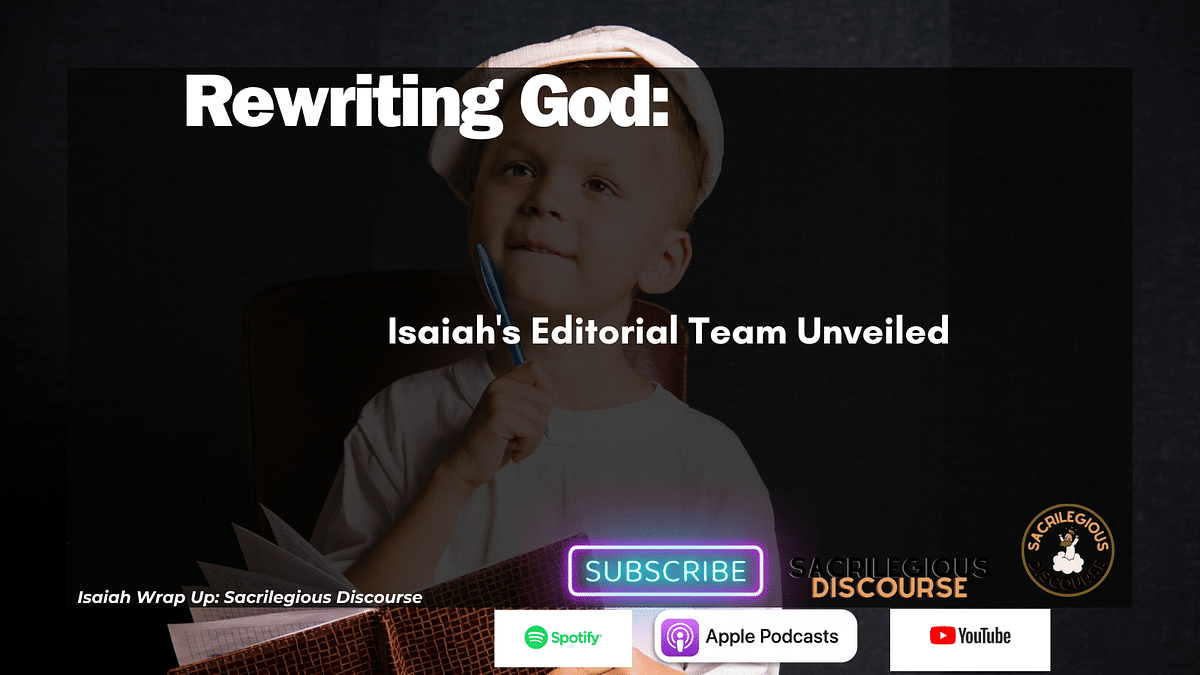
If you thought the divine word was sacrosanct, immutable, and served with a side of heavenly fries, brace yourself for the ultimate revelation. The Book of Isaiah, often paraded around as the unquestionable manifesto of prophetic insights, turns out to be more of a patchwork quilt stitched together by a merry band of ancient editors. Welcome to "Rewriting God: Isaiah's Editorial Team Unveiled," where we peel back the layers of this biblical onion, only to find more onions.
Now, let's get one thing straight: we're not here to rain on anyone's prayer parade. But if you've been keeping up with the latest scholarly shindig, you'd know that the idea of Isaiah being a one-prophet-show is about as credible as a serpent with a side hustle in fruit sales. According to our podcast deep dive into the maze that is the Book of Isaiah, it appears we have more authors in this narrative than a conspiracy theory convention.
Let's break it down, shall we? We've got Proto-Isaiah, Deutero-Isaiah, and Trito-Isaiah—each section sounding more like a rejected Star Wars droid than a cohesive piece of literature. It's like our main man Isaiah had enough foresight to predict the need for sequels before Hollywood even existed. How avant-garde of him.
The first chunk of this prophecy pie, Proto-Isaiah, is supposedly the OG prophet's work. But as the chapters progress, it becomes increasingly apparent that there's a tag-team effort at play. By the time we hit Deutero-Isaiah, we're basically reading fan fiction set during the Babylonian exile, complete with a promised Messiah who turns out to be none other than Cyrus the Great—talk about a plot twist worthy of M. Night Shyamalan.
As for Trito-Isaiah, it's an anthology that feels more like a spiritual mixtape made by a group of unknown prophets who probably had one too many cups of ceremonial wine. They're riffing off each other, adding layers of hope and restoration with the creative freedom of a jazz improvisation session. And here we thought the divine message was supposed to be clear-cut and singular. Silly us.
But wait, there's more! Amidst this prophetic potpourri, we're supposed to swallow the colossal leap towards monotheism like it's no biggie. Isaiah goes from a divine anthology of deities to "There's only one God, and he's got a penchant for drama." It's like watching a reality TV show where the lead character suddenly decides to be the sole star, kicking all the supporting cast to the curb.
And let's not gloss over the juicy tidbit where Isaiah supposedly walked around naked as a sign act. If that's not an attention-grabbing editorial decision, I don't know what is. Imagine pitching that to a modern publisher: "So, in the next chapter, our hero strips down to his birthday suit to really drive the point home." Yeah, that'll sell like hotcakes—or not.
Now, we're not saying that the Book of Isaiah doesn't have its merits. It's a fascinating glimpse into the evolving relationship between the Israelites and their concept of God. But let's not kid ourselves into thinking this is the unadulterated word of some sky-daddy delivered through a single mouthpiece. Isaiah's editorial team was hard at work, chiseling away at the narrative, ensuring that it catered to the needs and politics of the time.
Unleash endless audiobooks & podcasts with Audible Plus: 30 days FREE, then just $7.95/month. ✨ Click & dive in!
In conclusion, if you're seeking a straightforward divine directive, you might want to look elsewhere because the Book of Isaiah is more of a "choose your own adventure" than a divine decree. It's a reminder that holy texts are not immune to human touch, and perhaps, in understanding their complex creation, we can appreciate the historical context without having to take every word as gospel.
Now, don't mind us as we continue to question everything and wait eagerly for the next biblical retcon. After all, who needs consistency when you have a divine editorial board capable of the greatest story ever re-told, right?






